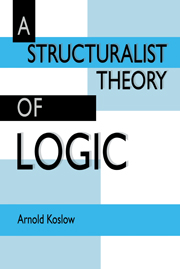Book contents
- Frontmatter
- Contents
- Preface
- Part I Background
- Part II Implication relations
- Part III The logical operators
- 11 Hypotheticals
- 12 Negations
- 13 Conjunctions
- 14 The disjunction operator
- 15 The logical operators parameterized
- 16 Further features of the operators
- 17 The dual of negation: Classical and nonclassical implication structures
- 18 The distinctness and relative power of the logical operators
- 19 Extensionality
- 20 Quantification
- 21 Identity
- 22 Special structures I: Logical operators on individuals: Mereology reconstituted
- 23 Special structures II: Interrogatives and implication relations
- 24 Completeness
- Part IV The modal operators
- Appendix A An implication relation for the integers in the programming language BASIC
- Appendix B Symmetric sequents as products of implication relations and their duals
- Appendix C Component-style logical operators and relevance
- Notes
- Bibliography
- Index
22 - Special structures I: Logical operators on individuals: Mereology reconstituted
Published online by Cambridge University Press: 05 May 2010
- Frontmatter
- Contents
- Preface
- Part I Background
- Part II Implication relations
- Part III The logical operators
- 11 Hypotheticals
- 12 Negations
- 13 Conjunctions
- 14 The disjunction operator
- 15 The logical operators parameterized
- 16 Further features of the operators
- 17 The dual of negation: Classical and nonclassical implication structures
- 18 The distinctness and relative power of the logical operators
- 19 Extensionality
- 20 Quantification
- 21 Identity
- 22 Special structures I: Logical operators on individuals: Mereology reconstituted
- 23 Special structures II: Interrogatives and implication relations
- 24 Completeness
- Part IV The modal operators
- Appendix A An implication relation for the integers in the programming language BASIC
- Appendix B Symmetric sequents as products of implication relations and their duals
- Appendix C Component-style logical operators and relevance
- Notes
- Bibliography
- Index
Summary
Introduction
It has been a recurrent theme in this study that the logical operators are functions on implication structures, simple or extended, and that these structures are so varied in their objects that the study of the logical operators is truly topic-neutral.
The conjunction and negation operators, for example, are defined over all implication structures, so that one can think of conjunctions of sets, statements, properties, individuals, and so forth. The subject in each case is only as interesting as the implication relations with respect to which the operators are relativized. Any set, and in particular a set of objects (or a set of names of those objects), can be thought of as having an implication relation on it. The question is whether or not there is an implication relation on a set of individuals, or the set of names of those individuals, that has theoretical interest. We shall call implication relations on individuals objectual implication relations (and implication on names of individuals, nominal implication).
It might be thought that the whole idea of an implication relation holding between individuals is incoherent, since implication is a relation between truth-bearers. On the more general view that we have advocated, the fact that individuals and names are not generally truthbearers is no impediment to the development of a theory of the logical operators on them. All that is required, since all the logical operators are relativized to implication relations, is that an implication relation be specified for them.
- Type
- Chapter
- Information
- A Structuralist Theory of Logic , pp. 209 - 217Publisher: Cambridge University PressPrint publication year: 1992



